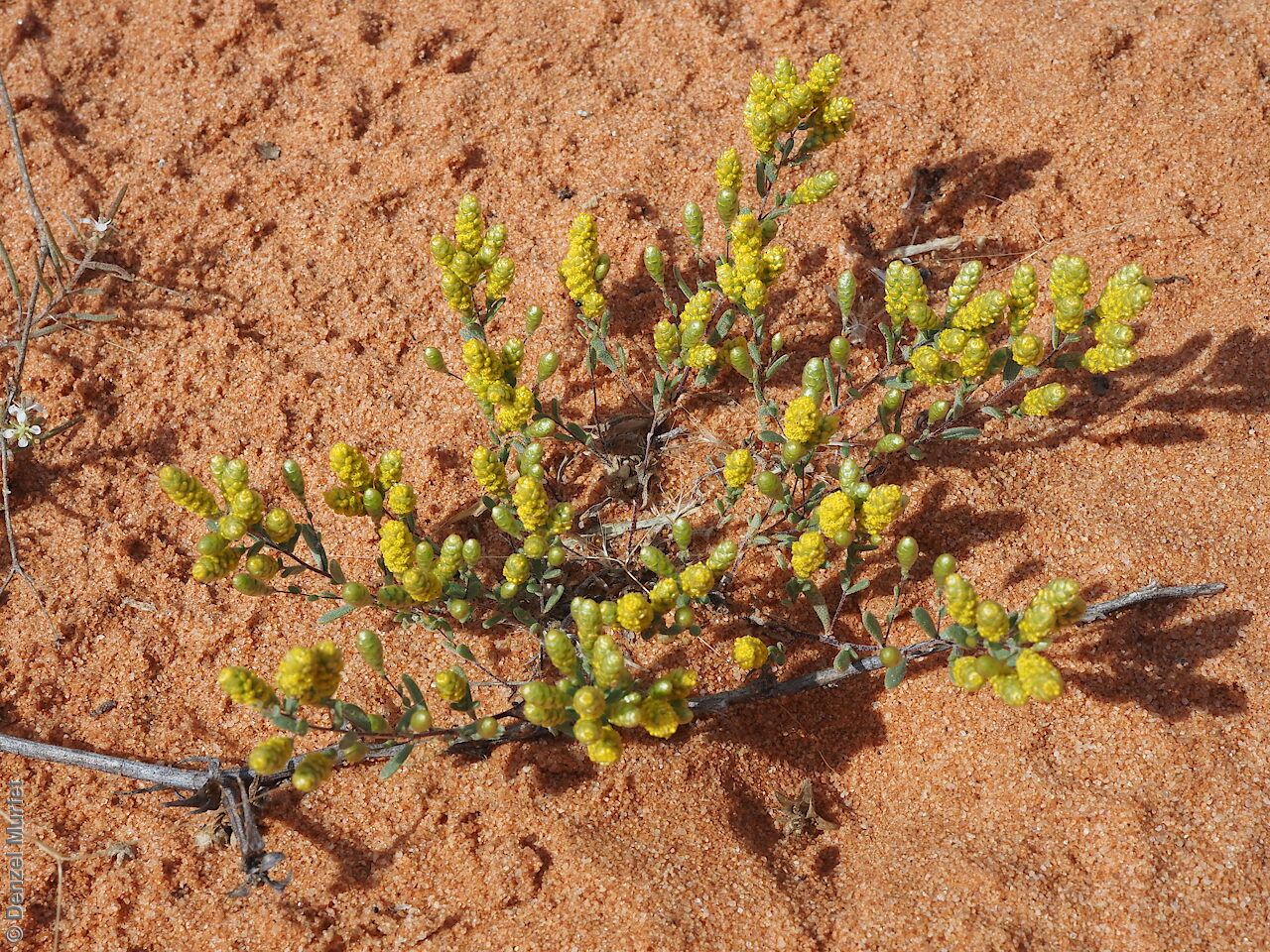Dwarf Cup-flower,
Dwarf Golden-tip
Display all 18 images


















Regional Species Conservation Assessments per IBRA subregion.


Least concern
Near threatened
Rare
Vulnerable
Endangered
Critically endangered
Extinct
Data deficient
Adelaide
Arkaroola
Ceduna
Coober Pedy
Hawker
Innamincka
Marla
Marree
Mount Gambier
Oodnadatta
Renmark
Wudinna
Keith
Yunta
Display IBRA region text
| Broughton (FLB02) | Flinders Lofty Block | Near Threatened (Probable Decline) [Edge of range. Limited habitat. Grazing and cropping a threat.] |
| Olary Spur (FLB03) | | Least Concern |
| Northern Flinders (FLB05) | | Least Concern [undercollected ] |
| Central Flinders (FLB06) | | Rare (IUCN: RA d(i,ii)) |
| St Vincent (EYB02) | Eyre Yorke Block | Near Threatened (Probable Decline) [Edge of range. Limited habitat. Grazing and cropping a threat.] |
| Eyre Hills (EYB03) | | Least Concern |
| Eyre Mallee (EYB05) | | Least Concern |
| South Olary Plain (MDD01) | Murray Darling Depression | Rare (IUCN: RA d(ii)) |
| Murray Scroll Belt (RIV06) | Riverina | Rare (IUCN: RA d(ii)) |
| Myall Plains (GAW01) | Gawler | Least Concern |
| Gawler Volcanics (GAW02) | | Least Concern |
| Gawler Lakes (GAW03) | | Least Concern |
| Arcoona Plateau (GAW04) | | Least Concern |
| Kingoonya (GAW05) | | Least Concern |
| Torrens (GAW06) | | Least Concern [undercollected ] |
| Roxby (GAW07) | | Least Concern |
| Commonwealth Hill (GAW08) | | Least Concern |
| Maralinga (GVD03) | Great Victoria Desert | Least Concern |
| Kintore (GVD04) | | Least Concern |
| Tallaringa (GVD05) | | Least Concern |
| Yellabinna (GVD06) | | Least Concern |
| Carlisle (NUL01) | Nullarbor | Least Concern |
| Nullarbor Plain (NUL02) | | Least Concern |
| Barrier Range (BHC01) | Broken Hill Complex | Least Concern |
| Barrier Range Outwash (BHC04) | | Least Concern |
| Bimbowrie (BHC05) | | Least Concern |
| Curnamona (BHC06) | | Least Concern |
| Simpson Desert (SSD02) | Simpson Strzelecki Dunefields | Least Concern [undercollected ] |
| Dieri (SSD03) | | Least Concern [undercollected ] |
| Warriner (SSD04) | | Least Concern [undercollected ] |
| Strzelecki Desert (SSD05) | | Least Concern [undercollected ] |
| Breakaways (STP01) | Stony Plains | Least Concern [undercollected ] |
| Oodnadatta (STP02) | | Least Concern [undercollected ] |
| Murnpeowie (STP03) | | Least Concern [undercollected ] |
| Witjira (STP06) | | Least Concern [undercollected ] |
| Baltana (STP07) | | Least Concern [undercollected ] |
| Sturt Stony Desert (CHC02) | Channel Country | Least Concern [undercollected ] |
| Coongie (CHC06) | | Least Concern [undercollected ] |
| Mann-Musgrave Block (CER01) | Central Ranges | Least Concern |
| Watarru (CER02) | | Least Concern |
| Everard Block (CER03) | | Least Concern |
| Tieyon (FIN03) | Finke | Least Concern [undercollected ] |
| 4 of 6 subregions | Flinders Lofty Block | Least Concern , Near Threatened , Rare |
| 3 of 5 subregions | Eyre Yorke Block | Least Concern , Near Threatened |
| South Olary Plain (MDD01) | Murray Darling Depression | Rare (IUCN: RA d(ii)) |
| Murray Scroll Belt (RIV06) | Riverina | Rare (IUCN: RA d(ii)) |
| 8 of 8 subregions | Gawler | Least Concern |
| 4 of 4 subregions | Great Victoria Desert | Least Concern |
| 2 of 3 subregions | Nullarbor | Least Concern |
| 4 of 4 subregions | Broken Hill Complex | Least Concern |
| 4 of 4 subregions | Simpson Strzelecki Dunefields | Least Concern |
| 5 of 7 subregions | Stony Plains | Least Concern |
| 2 of 4 subregions | Channel Country | Least Concern |
| 3 of 3 subregions | Central Ranges | Least Concern |
| Tieyon (FIN03) | Finke | Least Concern [undercollected ] |
Botanical art
Kath Alcock paintings: 2
Prior names
Chrysocoryne angianthoides
Crossolepis pusilla
Angianthus pusillus
Siloxerus pusillus
Styloncerus pusillus
Chrysocoryne huegelii
Chrysocoryne pusilla
Common names
Dwarf Cup-flower
Dwarf Golden-tip
Etymology
Gnephosis of uncertain etymology. Tenuissima from the Latin 'tenuis' meaning very slender; alluding to the slender habit of this species.
Distribution and status
Found across much of South Australia except on Kangaroo island, York Peninsula, Mount Lofty Ranges and the South-east, growing on a variety of soils and habitats. Also found in all mainland states. Native. Common in South Australia. Rare in Victoria. Common in the other states.
Herbarium regions: North Western, Lake Eyre, Nullarbor, Gairdner-Torrens, Flinders Ranges, Eastern, Eyre Peninsula, Northern Lofty, Murray
NRM regions: Alinytjara Wilurara, Eyre Peninsula, Northern and Yorke, South Australian Arid Lands, South Australian Murray-Darling Basin
AVH map: SA distribution map (external link)
Plant description
Annual herbs to 15 cm high, simple or branched. Leaves elliptic to linear or obovate to oblanceolate, to 30 mm long and 4 mm wide, apex often glassy, scale-like hairs usually present. Flower heads club-shaped or spike-like, to 22 mm long and 7 mm diameter with yellow flowers. Flowering between August and December. Fruits are creamy to pale brown head. Seed embryo type is spatulate.
Seed collection and propagation
Collect seeds between October and February. Collect heads or whole plants that are pale brown or turning brown. Each head should have numerous tiny seeds. Place the heads in a tray for a week to dry. Then rub the heads gently with your hands to dislodge the seeds. Use a fine sieve to separate the seeds from the unwanted material. Be careful as the seeds are very small. Store the seeds with a desiccant such as dried silica beads or dry rice, in an air tight container in a cool and dry place. Seeds are non-dormant, viable seed should germinate readily.



















